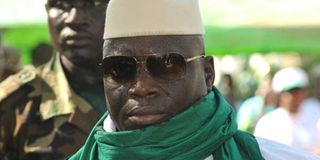Gambian soldiers launch unsuccessful coup against President Yahya Jammeh

Gambian President Yahya Jammeh greets supporters during a rally in Gambia on November 22, 2011. A military coup bid in the small west African state of The Gambia was foiled early on December 30, 2014, while President Yahya Jammeh was abroad, military and diplomatic sources said. AFP PHOTO | SEYLLOU
What you need to know:
- Army sources and residents of the city confirmed the report and said the attackers had been driven back.
- Soldiers had prevented some civilians from going to work in the morning, an AFP journalist said.
- Jammeh has ruled over the largely rural country of some 1.8 million people since 1994, when he seized power in a military coup himself.
- Gambian officials said the president was on a private visit to Dubai, but foreign diplomats said Jammeh was in France.
BANJUL, Gambia,
Gambian soldiers launched a pre-dawn coup bid in the capital Banjul while President Yahya Jammeh was abroad, military and diplomatic sources said Tuesday.
The coup, however, appeared to have been foiled.
"The presidential palace was attacked very early this morning, at around 3:00am (0300 GMT), by armed individuals of whom some came from the presidential guard," a Gambian diplomat said.
Army sources and residents of the tropical city, which lies on an island near the mouth of the Gambia river, confirmed the report and said the attackers had been driven back.
"They wanted to overthrow the regime," a military source in the small west African country told AFP, while a Western diplomat said a coup attempt has "apparently been foiled".
Soldiers had prevented some civilians from going to work after the shooting, an AFP journalist said, amid disruption in parts of Banjul, where patrols of loyal troops urged people to stay home and be calm.
"The police and the army entirely control the situation," an army officer said.
No casualty figures from the overnight clashes have been issued, but sources in the regional Gambian diaspora reported both deaths and injuries.
CAME TO POWER IN COUP
The former head of military police, Jammeh has ruled the largely rural nation of some 1.8 million people with a firm hand since 1994, when he came to power in a coup that ousted founding leader Sir Dawda Jawara.
First elected into presidential office in the mainly Muslim former British colony two years later, at just 31, Jammeh initially outlawed political parties that had operated under Jawara, decrying endemic corruption.
Jammeh's precise whereabouts remained unclear.
Gambian officials said the president was on a private visit to Dubai, but foreign diplomats said he was in France.
Backed by his Alliance for Patriotic Reorientation and Reconstruction (APRC) party, which enjoys a large majority in parliament, Jammeh has come under fire for serious human rights abuses, including the disappearing of his foes.
The December 2004 killing of prominent journalist and critic of the regime Deyda Hydara, who edited The Point newspaper and was also an AFP correspondent, caused uproar both in The Gambia and abroad.
POOR RIGHTS RECORD
Allegations linking the murder to Jammeh and his circle have gone no further and in the wake of the affair, the president imposed tough measures in a crackdown on press freedom.
The conservative, outspoken leader has denounced gays and lesbians, once threatening to behead them but instead overseeing the imposition of long jail terms.
In 2013, Jammeh told the UN General Assembly that homosexuality was "becoming an epidemic" to be fought by Muslims and Africans alike.
Sensitive to criticism, the government in October 2013 announced it was leaving the Commonwealth and accused Britain and the United States of engaging in a "shameless campaign of lying" about The Gambia's rights record.
In a state media broadcast, the Gambian government described the 54-nation group of former British colonies and their partners of being a "neo-colonial" institution.
The whole country is a long, thin strip of land that lies either side of the Gambia river, sandwiched between the northern bulk of Senegal and the former French colony's southern Casamance province.




